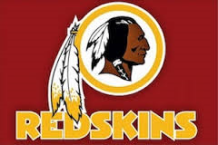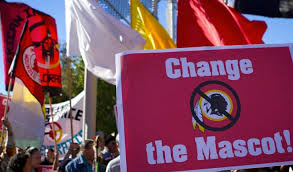“We are People, not Mascots” was a discussion held on campus to elevate the consciousness surrounding sport-teams’ mascots that offensively portray Native Americans.
Dr. Chad Waucaush, College of Southern Nevada history professor, facilitated the discussion about the use of Native American imagery in sports. As part Native American, Waucaush is passionate about this issue.
From football to hockey there are a number of professional and college sports teams that use Native American mascots including but not limited to the following well-known teams: the Cleveland Indians, the Atlanta Braves, the Kansas City Chiefs, the Washington Redskins and the Chicago Blackhawks.
These teams use imagery that some find offensive. Often critiques claim the images are portraying Native American culture in negative light.
 For example the Cleveland Indians has a cartoon-like mascot who is red with a big nose. The Atlanta Braves has a Tomahawk as one its images. The fans do a chopping motion while shouting a war chant during games. The Kansas City Chiefs uses an arrowhead as part of its mascot, which hasn’t received as strong a critique as other team such as the Washington Redskins. It was involved in a lot of controversy recently based on the term “Redskins” that is derogatory. The team has yet to make any changes.
For example the Cleveland Indians has a cartoon-like mascot who is red with a big nose. The Atlanta Braves has a Tomahawk as one its images. The fans do a chopping motion while shouting a war chant during games. The Kansas City Chiefs uses an arrowhead as part of its mascot, which hasn’t received as strong a critique as other team such as the Washington Redskins. It was involved in a lot of controversy recently based on the term “Redskins” that is derogatory. The team has yet to make any changes.
Waucaush explained, “Using neon paint, painting your face red and jumping around seems to be a far cry from honoring Native American people.”
“There is a growing movement among Native American people to look at the use of Native imagery in athletics with an increasing critical lens,” Waucaush said. Stereotypes can show images of Natives as barbaric warriors and aggressive savages.
“Our society has progressed to the point where it is distasteful and culturally offensive to portray other ethnic groups in the same way that Native people are portrayed,” Waucaush said.
Native Americans petition and protest such portrayals and the teams that promote these images. “The movement is to bring attention to this,” Waucaush said. “I think the intent is to bring a degree of respect.”
The discussion titled “We are People, not Mascots” was held on CSN’s Charleston campus Nov. 9. It was part of campus events for Native American Heritage Month. The event was hosted by the All Nations Native Organization, a student group on campus.
At the discussion two short documentaries were screened from a series titled “Savage Country.” These documentaries offered opinion about the use of Native American figures and imagery in sports as well as the behavior associated with these teams and their mascots. There was insight and history told from a Native American perspective: specifically use of the word Redskins. The history of the word Redskins is associated not only with the color of Native American skin tone but of the bounties that were paid for the skins of Native Americans once they were killed and skinned.
“Events like this shouldn’t only be for college students,” said Joel Alaniz, CSN student who attended the discussion. “This should be taught in middle school. Mascots are being seen by everyone.
“This discussion was great and educational,” said Chris Van Leuven, CSN student. “I got to learn and see this issue from a new perspective.”
Waucaush suggests that there should be more education within the administration of colleges and universities who use Native imagery as mascots to reduce stereotyping and defamatory issues. He suggests that these institutions should be true to their missions to promote and disseminate information to understand the world better.
Waucaush said, “When students are learning about Native American history in their classes then going to sporting events where people are acting in ways that are culturally incorrect and that’s supported by the college, it is contradictory to the mission statements of these institutions of higher education.”
The CSN discussion on these very issues helped educate and heighten awareness and respect for Native Americans within our community, Waucaush said.




